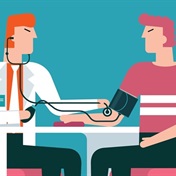Pharmacists can do much more for their customers than count pills. According to a pair of new reports, for instance, they can help reign in high blood pressure, which plays a major role in strokes and heart failure.
"Hypertension is a huge medical problem," said pharmacist Michael E. Ernst, who worked on one of the studies. "Despite plenty of effective drugs we still have lots people who don't achieve their blood pressure goals."
When pharmacists worked side by side with doctors, however, the number of patients who reached recommended blood pressure levels increased from about half to three-quarters.
"Pharmacists are an untapped resource," said Ernst, of the University of Iowa in Iowa City. "They have the skills and the training to be involved in the management of those patients."
The study
To probe that potential, Ernst and his colleagues enrolled 179 patients with high blood pressure at five different primary care clinics in Iowa City.
For some 100 of those patients, all randomly chosen, pharmacists worked with doctors to find the best drug treatment, while the rest of the patients received standard physician care.
After nine months, the patients who had been treated by the physician-pharmacist team saw an average drop of 29 points in their systolic blood pressure readings, from 153 to 124.
Blood pressure is typically described as systolic, or maximum pressure on blood vessel walls, "over" diastolic, or minimum pressure, with an average normal blood pressure being around 120 over 80.
The drop was only about 17 points for those who hadn't been seen by a pharmacist, leaving them with an average systolic pressure of 133.
Pharmacist nudge doctors
Ernst said pharmacists often nudged busy doctors to have an extra look at a patient's blood pressure, instead of focusing only on the most pressing medical problems.
"Patients may have several medical conditions and maybe some of those conditions are more severe than the blood pressure problem," Ernst said.
Dr Eric Peterson, an expert in heart disease at Duke University Medical Centre in Durham, North Carolina, welcomed the new results, which appear in the Archives of Internal Medicine.
"This study, like several in the field, shows the potential promise of a collaborative model for management of risk factors, in this case blood pressure," he said.
Teamwork is essential
He said teamwork was important because physicians simply don't have the time it takes to find the best therapy for patients and monitor their blood pressure.
But far from all clinics have a pharmacist at their disposal.
"The issue has been that we haven't able to find a model of reimbursement in America that would support this," Peterson said. "If you hire a pharmacist, that would mean less money to the doctor."
Ernst said his findings line up with smaller studies and research from hospitals. Another study published in the journal Diabetes Care, showed that involving a pharmacist in the care of diabetics lowered the patients' blood pressure.
According to the authors, that blood pressure drop corresponds to a decrease in the patients' estimated risk of heart disease and stroke by 3% over a year, whereas the risk fell only 1% without the pharmacists' participation.
Brief encounter
Still, the only contact many people have with pharmacists is the occasional brief encounter at Walmart or CVS. And it might be a different story when pharmacists don't work closely with doctors, said Dr Alexander V. Prokhorov, of the University of Texas MD Anderson Cancer Centre in Houston.
In a study also published in the Archives of Internal Medicine, he found that training community pharmacists to counsel customers in smoking cessation didn't pan out.
"I think that there are a number of obstacles that prevent pharmacists from intervening on smoking cessation among their clients," he said.
"For example, the lack of privacy, especially in large stores, might influence the quality and outcomes from a pharmacist's delivered counselling. The high workload is another barrier, just look at the average number of prescriptions that pharmacists have to fill and insurance claims they have to file per day."
Still, Ernst said finding a good community pharmacist is important for patients with chronic disease and may help prevent medication errors.
"We would advocate that patients utilize one pharmacy for all of their different medicines and get to know their pharmacists," he said. "Shop around and find that pharmacy that you're comfortable with."
(Reuters Health, Frederik Joelving, October 2010)
Read more:




 Publications
Publications
 Partners
Partners










